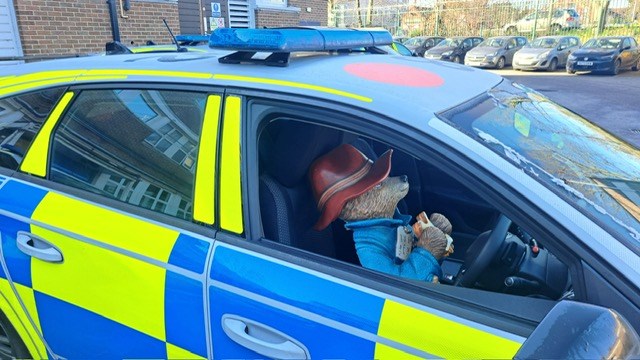British spectacles of public togetherness usually signal that an episode of collective psychosis is around the corner. Think of the death of Diana, or the cult of Captain Tom. But nothing has prepared us for Paddington Bear, the cuddly children’s toy that has somehow become a conduit for state anxiety about “kindness and integration” in the face of unprecedented mass migration, state failure and the collapse of the old organs of culture and media to reckon with contemporary Britain.
A decade ago, the elevation of a cuddly toy to a state-endorsed icon might have seemed a bit off. But the Britain of 2025 is a strange place. “A feel-good start to the week,” the BBC gushed this week as the UK’s Japanese ambassador smiled nervously next to the bear. Last summer, while the police struggled to contain a baying mob outside an asylum hotel, the bear popped up on social media to lend a hand: “Perhaps it’s time for a little more kindness.”
When two drunken RAF engineers felled a statue of Paddington in the Berkshire town of Newbury earlier this month, who knows what repressed urges were being unleashed. The sentencing magistrate certainly seemed suspicious yesterday: “He represents kindness, tolerance and promotes integration and acceptance in our society […] your actions were the antithesis of everything Paddington stands for.” Appalled witnesses lined up to testify, a Newbury Nuremberg for this very British atrocity. The remaining parts, said Trish from the council, had to be covered in a bin bag as “children would find it upsetting to see the statue completely destroyed.”
The genre is now well worn: Paddington Bear is twee, unbearable and infantile. But it’s also curiously sinister, part of a broader reactionary force by a preening, cynical establishment trying to find its feet in the ongoing upheaval of 21st-century Britain. The canonical essay on the subject is J’Accuse’s “The Posh Turn”, which documents the consolidation — and legitimation — of the post-1997 order, shored up with a raiding of Britain’s heritage, nostalgia, and the witticisms of Stephen Fry.
“Britishness” in the authentically spontaneous sense no longer seems to really exist in the public realm. Footy and fish and chips, the Royal Family, dogs in pubs: these are all the anaemic offerings to a desperate Starmerite nation-building project. Any collective memory or past icon is now foisted on the public by a pandering, secretive committee which is actually frightened of ordinary people. Observe Mike Tapp, Keir Starmer’s John Bull, who nervously teases out the views of his followers on social media with his jarringly worded polls. “What’s your favourite British activity for a Sunday?” he asked this month. The options were: “roast”, “walk”, “football/rugby” and “all of them”.
Compare this to another tribal force that has swept British social media: the popular coinage of the “Yookay” to describe the multicultural, garish, vulgar, surreal and increasingly dysfunctional Britain that has emerged this century. In some respects, it’s an aesthetic — a mood with which you can only really grapple when walking around streets and towns swollen by decay and mass immigration, and guided by an entirely separate sphere of social-media networks and subcultures. It is a world almost alien to the official Paddington nexus of “British values” within the media, sport and now the state.
But it’s also the triumph of an apparently reactionary “very online” vanguard to define — in the absence of any influential political and cultural commentariat — the terms of satire and understanding and even acknowledgement of this New Britain. This is a nation which exists beyond bland BBC 2 documentaries, Netflix dramas-cum-nagging PR stunts, and the pious waffle of magistrates and politicians.
Vast swathes of Britain’s public figures are no longer really interested in the country in which they live. See the recent Sunday Times “Best Places to Live”, which showcased a veritable flight of the upper and middle classes to the shires, a retrograde arcadia of Georgian terraces, muddy wellies and country blossom (yes, the intact statue popped up in the feature on Newbury).
In a Cummingsite turn, talk of “rewiring” the British state, reforming the blob and bringing the state into the 21st century has even reached Labour’s backbenchers. But the next challenge seems far harder: an overhaul of modern British mores, tastes and manners, an awakening from its whimsy and oblivion into a new and unavoidable nation.











Join the discussion
Join like minded readers that support our journalism by becoming a paid subscriber
To join the discussion in the comments, become a paid subscriber.
Join like minded readers that support our journalism, read unlimited articles and enjoy other subscriber-only benefits.
Subscribe